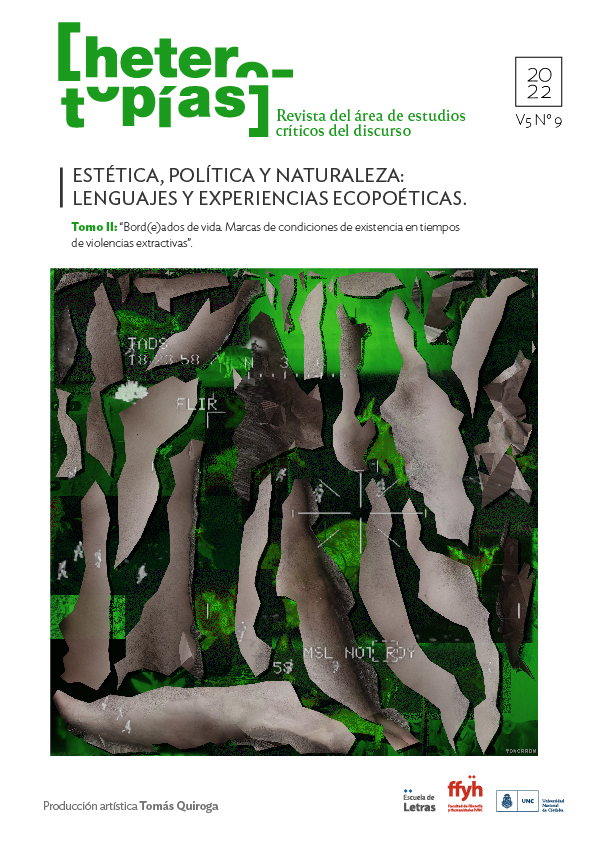Santōka's wandering walk
Main Article Content
Abstract
To go without aim, without destination and on foot. That is the journey of the late Zen monk, walker and haiku poet Taneda Santōka. What singularities propitiates his journey to poetic writing? This paper answers this question based on theoretical reflection and reading of Santōka's Mendicant Diaries. Considering the travel theories of David Le Breton and Michel Onfray, we revisit the concepts of walking, paths and slowness to analyze a selection of haikus and fragments from the 1930 travel diary. Thus, this paper aims to construct a poetics of wandering as a tool to approach Santōka's work.
Downloads
Article Details

This work is licensed under a Creative Commons Attribution-NonCommercial-ShareAlike 4.0 International License.
Those authors who have publications with this journal, accept the following terms: Those authors who have publications with this journal, accept the following terms:
a. The authors will keep their copyright and guarantee to the journal the right of first publication of their work, which will be simultaneously subject to the Creative Commons Attribution - Non-Commercial - Share Alike (by-nc-sa) Attribution License; no commercial use of the original work or any derivative works is allowed, the distribution of which must be done with a license equal to the one that regulates the original work.
b. Authors may adopt other non-exclusive license agreements for the distribution of the published version of the work (e.g., deposit it in an institutional telematic archive or publish it in a monographic volume) provided that the initial publication in this journal is indicated.
c. Authors are allowed and recommended to disseminate their work through the Internet (e.g. in institutional telematic archives or on their website) before and during the submission process, which may lead to interesting exchanges and increase the number of citations of the published work. (See The effect of open access).
How to Cite
References
Abrahms, J. (1977). Hail in the in the begging bowl: the odyssey poetry of Santōka. Monumenta Nipponica, 32 (3) 269-302. Recuperado de: https://doi.org/10.2307/2384370
Aira, C. (21 de junio de 2001). El viaje y su relato. España: El País.
Barthes, R. (1993). El imperio de los signos. Madrid: Mondadori.
Barthes, R. (2005). La preparación de la novela: notas de cursos y seminarios en el Collège de France, 1978-1979 y 1979-1980. Buenos Aires: Siglo XXI Editores.
Colombi, B. (2006). El viaje y su relato. En: Latinoamérica, 2(43), 11-35.
Haya, V. (2013). Aware: iniciación en el haiku japonés. Barcelona: Kairós.
Izutsu, T. (2009). Hacia una filosofía del budismo zen. Madrid: Trotta.
Le Breton, D. (2014). Caminar. Elogio de los caminos y la lentitud. Buenos Aires: Waldhuter.
Melchy Ramos, Y. (2018). Sin dinero, sin pertenencias, sin dientes. Sólo yo. La génesis del haiku de ritmo libre y la poética de Taneda Santōka (1882-1940). En: Mirai. Estudios japoneses, 2, 175-188. Recuperado de: https://revistas.ucm.es/index.php/MIRA/article/view/60503
Onfray, M. (2016). Teoría del viaje. Geografía poética. México: Taurus.
Santōka, T. (2003). For all my walking. Free-verse Haiku of Taneda Santōka with Exerpts from His Diary [Introducción y traducción de Burton Watson]. New York: Columbia University Press.
Santōka, T. (2004). Saborear el agua. Madrid: Hiperión.
Santōka, T. (2006). El monje desnudo. Madrid: Miraguano.
Shirane, H. (2018). Poesía y naturaleza. En: Hoyos Hattori, P. y Stilerman, A. (Eds.). El archipiélago, (pp. 21-45). Buenos Aires: Lomo.
Scott, E. (2019). Caminantes. Argentina: Godot.
Stevens, J. (1980). Mountain Tasting: zen haiku by Taneda Santōka. New York: Weatherhill.
